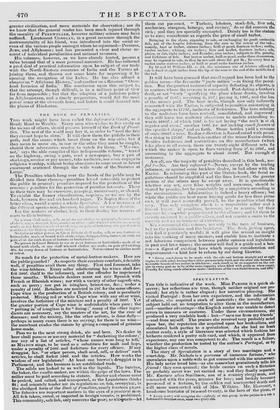SPECULATION.
THE title is indicative of the work. Miss PARDOE is a quick ob- server; her reflections are true, though neither original nor pro- found; her style is rather elegant; her narrative pleasing. She visited Portugal : from her own experience, and the information of others, she acquired a stock of materials ; the novelty of the subject held out no temptation to alter them in the manufacture, and—another advantage—the Euglish render was unable to detect errors in manners or costume. Under these circumstances, she produced a very readable book : but—" save me from my friends" —and from myself. The praises she received very probably acted upon her, the reputation she acquired upon her booksellers, and stimulated both parties to a speculation. As she had no fresh matter ready, a style of literature was selected which fashion has hitherto rendered a pretty safe card, and which, it appeared from experience, any one was competent to do. The result is a failure, whether the production be tested by the author's Portugal, or by the higher class of novels. The story of Speculation is a story of two marriages and a courtship. Mr. Nichols is a parvenu of immense fortune,* who speculates upon a noble wife to get connected with the aristocracy. His lady never loved him—as she somewhat gratuitously tells his friend: they soon quarrel; the bride carries on such a flirtation as probably never was yet carried on ; and they finally- separate. Mr. Eustace alias Smithson, son of a country clergyman, and connected with the press, marries for love; and luckily becomes possessed of a fortune, by the sudden and unexpected death and still more unexpected will of Mrs, Wilkins. Mr. Harcourt* a handsome barrister of twa-and-twenty, is the hero of the piece, or • Every read.;' will recoguiae the orienals of this group, its the parties tO a tale fashionable heullletyme4, some two. raKSAlft




















 Previous page
Previous page